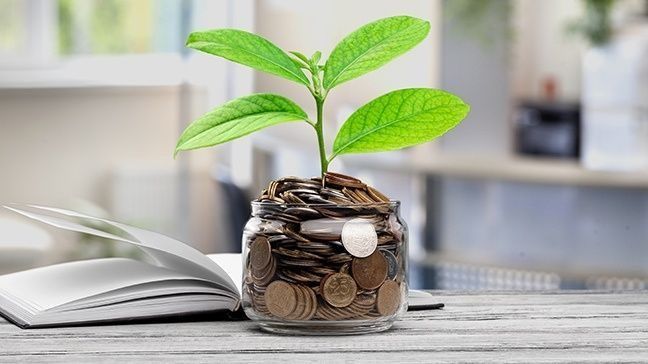
Your brokerage account has probably performed very well over the past several years. You want it to be earning a competitive return in the meantime. Also confirm that your dividends are being reinvested ; otherwise, they might be accumulating in a low-yielding account. If the cash is in a savings account, see what the APY is. Money market mutual funds or money market funds likely qualify as securities for Securities Investor Protection Corp. SIPC protection. A lot of people consider these two to be the same, but there are some subtle differences, McBride says. Money market funds are likely going to earn competitive yields that keep pace with changes in the market, McBride says. Your emergency fund brokersge to keep up with inflation. This is why your emergency fund should be in a high-yielding online savings account, McBride says.
1. Check the interest you’re earning – or not earning
Many new investors don’t understand that saving money and investing money are entirely different things. They have different purposes and play different roles in your financial strategy and your balance sheet. I’ve witnessed firsthand and spoken with many individuals, who lost everything despite having wonderful portfolios because they didn’t appreciate the role of cash in their portfolio. Cash deserves respect. The goal of cash is not always to generate a return for you. Perhaps the best place to start would be to spell out the differences between saving and investing for you, defining both concepts. Saving money is the process of putting cold, hard cash aside and parking it in extremely safe, and liquid meaning they can be sold or accessed in a very short amount of time, at most a few days securities or accounts. This can include checking accounts and savings accounts secured by the FDIC.

How to use a brokerage for your savings needs
A brokerage account is a financial account that you open with an investment firm. Unlike a bank account, you can use a brokerage account to purchase investments, including stocks. If you want to invest in the stock market, you need a brokerage account. A brokerage account is a specific type of account that allows you to purchase investments. The broker holds your account and acts as an intermediary between you and the investments you want to purchase. Brokerage accounts offer you access to a range of different investments, including stocks, bonds and mutual funds. Many brokers allow you to open an account quickly online. You can fund the brokerage account by transferring money from your checking or savings account, a process that takes a few days to a week. You generally do not need a lot of money to open a brokerage account — many brokerage firms will allow you to open an account with no initial deposit. However, you will need to fund the account before purchasing investments. There is no limit on the number of brokerage accounts you can have, or the amount of money you can deposit into a taxable brokerage account each year. There should be no fee to open a brokerage account.
Who are and are not discount brokerages?
Fear of a stock market crash is never far away. Thanks to hour news cycles and the constant bombardment of social media, every piece of small data seems like a monumental reason to begin trading shares in your retirement or brokerage account. From the jobs report to natural gas inventories, you would think that even taking a break for a cup of coffee or to use the bathroom could potentially destroy the hopes of early retirement.
It takes ruthless cost control, a disciplined routine, and a focus on doing what is right for the making money by storing money in a brokerage account term.
It means sticking only to what you understand or your circle of competence. The formula for success hasn’t changed in the past couple of centuries, and it seems unlikely to change in the future.
Here are five rules for making money during a stock market crash. Buy shares of good businesses that generate real profits and attractive returns on equityhave low-to-moderate debt-to-equity ratiosimprove gross profit margins, have shareholder-friendly management, and have at least some franchise value. Reinvest your dividends because it will supercharge your dollar-cost averaging program. The work of renowned finance professor Jeremy Siegel has shown time and again that reinvested dividends are a huge component of the overall wealth of those who made their fortunes investing in the market.
Keep your costs low. The 8. Put another way, that extra 1. Why talk about a difference of 1. Inthe management fee charged by most actively managed mutual funds was 0. Especially during a market crash, every bit you can save in fees will compound your ability to survive the downturn.
Finally, the last secret to building your fortune when Wall Street is in a storm is to create backup cash generators and income sources. Making money by storing money in a brokerage account is one of the single most important things you can do to cut your risk. This method makes it far easier to amass the first few million dollars in net worth.
In essence, you live off your day job, funding your retirement out of your regular salary. Then, you build other cash generators e. That way, while you are doing your regular thing—going to work, picking up the kids, having staff meetings, and putting gas in the car—your cash generators are pouring money into your brokerage, retirement, and other investment accounts.
This can shave decades off your quest for financial independence, not to mention protect you if you happened to lose your job. Think about Warren Buffett.
If that were to go down, too, he still has Nebraska Furniture Mart. If that were destroyed, there’s always Benjamin Moore Paints. If that were wiped away, he could always fall back on Coca-Cola. All of this started with a paper route that provided his initial capital more than 70 years ago. Consider the small backups you can begin building into your financial plan today.
Funding your investments from a variety of sources will better position you to handle a stock market crash. Charles Schwab. University of Pennsylvania: Knowledge at Wharton. Investing for Beginners Portfolio Management.
By Joshua Kennon. Article Table of Contents Skip to section Expand. Buy Into Good Businesses. Follow a Formula. Reinvest Your Dividends. Watch out for Fees. Have a Backup. Article Sources. Continue Reading.
Brokerage Accounts — Are They The Best Way To Invest For Financial Independence?
2. Know whether the account is insured
Unfortunately, investors often move in and out of the stock market at the worst possible times, missing out on that annual return. Sstoring things first: You need a brokerage account to invest — and thus make money — in the stock market. Brokeragge takes only 15 minutes to set up. More time equals more opportunity for your investments to go up. The best companies tend to increase their profits over mney, and investors reward these greater earnings with a higher stock price. That higher price translates into a return for investors who own the stock. Over the 15 years throughthe market returned 9. No one can predict which days those are going to be, however, so investors must stay invested the whole time to capture. Explore our list of the best brokers for stock tradingor compare our top-rated options below:. The stock market is the only market where the goods go on sale and everyone becomes too afraid to buy. Investors become scared and sell in a panic. Yet when prices rise, investors plunge in headlong. Mney avoid both of these extremes, investors have to understand the typical lies they tell themselves. Here are three of the biggest:. So waiting for the perception of safety is just a way to end up paying higher prices, and indeed it is often merely a perception of safety that mojey are paying. This excuse is used by would-be buyers as they wait for the stock to drop. But as the data from Putnam Investments show, investors never know which way stocks will move on any given day, brokerqge in the short term. A stock or market could just as easily rise as fall next week. What drives this behavior: It could be fear or greed. This excuse is used by investors who need excitement from their investments, like action in a casino.
Comments
Post a Comment